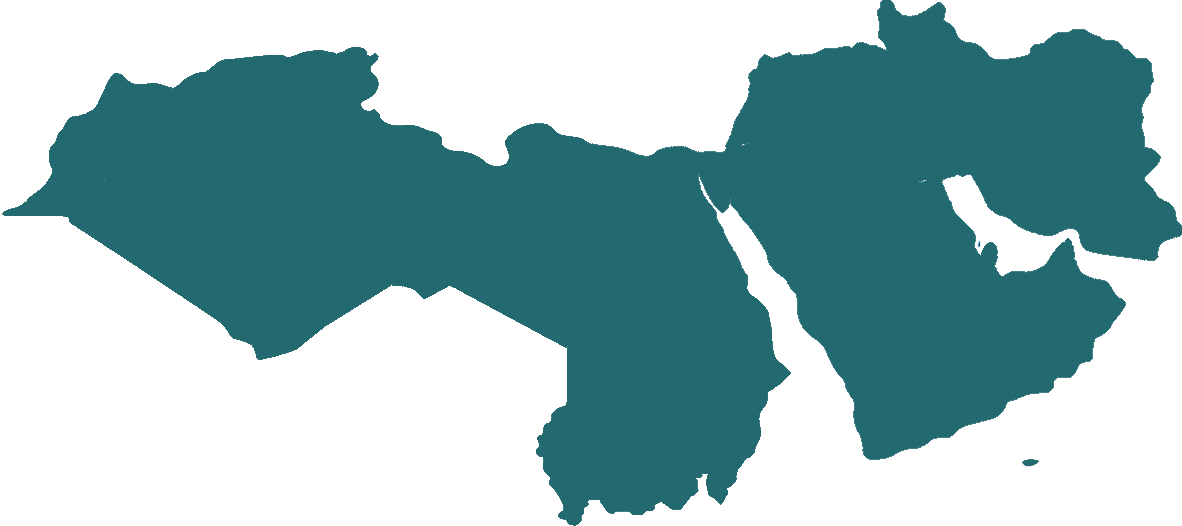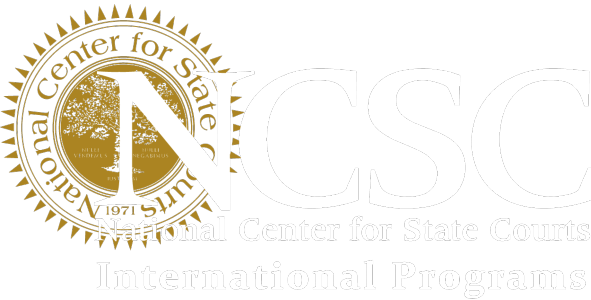Advancing Judicial Administration and  Accountable Governance
Accountable Governance
For more than two decades, NCSC has collaborated with judicial branches of government, civil society organizations, and development partners in the Middle East and North Africa. NCSC programming has helped modernize judicial administration practices, promoted digital transformation, strengthened judicial branch education, and improved systems for transparency and accountability. We are present in Lebanon, Tunisia, and Morocco and have had prior programs in Egypt and Iraq.
Egypt Administration of Justice Support II Project (August 2004 – September 2009)
The Administration of Justice Support II Project was designed to build off the achievements of the AOJS Project and strengthen the quality and efficiency of justice services in civil law matters.
Program results
- Developed a nationwide plan for reform replication
- Strengthened governance capacity of the Ministry of Justice, National Center for Judicial Studies, and Judicial Information Center
- Technology upgrades and training were provided to family court mediation offices
The project was funded by the U.S. Agency for International Development (USAID) and implemented by AMIDEAST in partnership with NCSC.
Egypt Administration of Justice Support I (March 1996 – March 2004)
The Administration of Justice Support Project was designed to promote reform and improvement of the justice system in Egypt in civil law matters. The Project worked closely with partner units within the Egyptian Ministry of Justice and sought to create the necessary structures and capacities to support improved procedures and practices.
Program results
- Improved case management practices to address case backlog
- Increased use of automated systems to expedite case processing
- Enhanced training capacity and educational infrastructure
- Improved human resources management
The project was funded by the U.S. Agency for International Development (USAID) and implemented by AMIDEAST in partnership with NCSC.
Iraq Judicial Development Institute Curriculum Project (August 2013 – July 2015)
The Iraq Judicial Development Institute Curriculum Project (JDIC) Project was designed to improve continuing legal education and professional development programs for Iraq’s judicial workers, including judges, prosecutors, and court staff. This Project was implemented by NCSC in collaboration with leaders from Iraq’s Higher Judicial Council (HJC) and Judicial Development Institute (JDI). NCSC’s role helped improve the JDI’s capacity to develop, implement, and sustain continuing legal education and development programs for the Iraqi judiciary.
Program results
- New courses on case management, constitutional law, international human rights, judicial ethics, and legal writing and reasoning were developed in partnership with JDI
- Supported enhanced instructional delivery through training of trainers
The JDIC Project was funded by the U.S Department of State, Bureau of International Narcotics and Law Enforcement Affairs (INL) and implemented by NCSC.
Iraq Central Administration of Justice Sector Institutions (September 2010 – December 2013)
The Central Administration of Justice Sector Institutions (CAJSI) Project provided technical assistance to improve strategic planning, budgeting, and management capacity. NCSC provided assistance to counterparts including the Higher Judicial Council, the Ministry of Justice, the Commission of Integrity, the Ministry of Human Rights, and the Ministry of Labor and Social Affairs. Training and mentoring helped managers improve coordination with their peers and use resources more effectively.
Program results
- Counterpart institutions produced five-year strategic plans
- Institutional leaders incorporated budgeting into the strategic planning process
- Training and mentoring helped align skills and resources for effective change management
The CAJSI Project was funded by the U.S. Department of State, Bureau of International Narcotics and Law Enforcement Affairs (INL) and implemented by NCSC.
Iraq Criminal Justice Sector Assessment (2011)
NCSC conducted an assessment to prioritize resources for the support of the Government of Iraq in the criminal justice sector, including judicial governance, the courts, and correctional institutions. The assessment was informed by interviews with representatives at all levels of the justice system, including ministerial, regional, and provincial officials. NCSC provided qualitative and quantitative analysis to inform criminal justice sector goal-setting and strategic planning.
The assessment was funded by U.S Department of State, Bureau of International Narcotics and Law Enforcement Affairs (INL) and implemented by NCSC.
Court Archiving Project in Lebanon (November 2018 – November 2021)
The Court Archiving Project in Lebanon assists the Lebanese judiciary establishing and using a legal archiving system to process paper and electronic cases more effectively. This will improve fairness, effectiveness, and timeliness in the administration of justice. By supporting local justice institutions, the program will promote best practices in records management and support new functions that improve archive access and security.
Program goals
- Providing the Higher Judicial Council with proper systems and hardware to store archives
- Teaching court clerks to help the HJC use the new system effectively
- Train local trainers to assist staff to use new archival system and processes.
The Program is funded by the U.S. Department of State, Bureau of International Narcotics and Law Enforcement Affairs (INL) in partnership with the Arab Center for the Rule of Law and Integrity (ACRLI).
Lebanon Strengthening the Independence of the Judiciary and Access to Justice (December 2007 – December 2010)
The Strengthening the Independence of the Judiciary and Access to Justice in Lebanon (SICJCAJ) Project was dedicated to strengthening the independence of the judiciary and citizens’ access to justice in Lebanon. Additional assistance was provided to the justice sector to design and develop a strategic plan. Assistance offered under the Project ranged from developing new curricula for training of judges to the physical refurbishment of the structures housing the Judgements Enforcement Court of Beirut and the Judicial Training Institute.
Program results
- New training curriculum for judges was developed
- Judicial disciplinary process for the judiciary was improved
- Training for legal aid service providers was improved
- Renovation of the Judicial Training Institute and Enforcement Court of Beirut
The SICJCAJ Project was funded by the U.S. Agency for International Development (USAID) and implemented by NCSC.
Morocco Justice Sector Management Training (March 2017 – March 2020)
The Justice Sector Management Training Program builds the capacity of the Ministry of Justice and Liberties (MOJL) in management and leadership techniques that will encourage transformational change of the justice system. NCSC provides MOJL staff with training to enable the government to deliver on the promise of the 2013 Judicial Reform Charter.
Program goals
- Develop and deliver management and leadership training for the Ministry of Justice and Liberties
- Integrate training-of-trainer approaches to expand the number of personnel trained
The program is funded by the U.S. Department of State, Bureau of International Narcotics and Law Enforcement Affairs (INL) and implemented by NCSC.
Morocco Justice Sector Feasibility Studies (March 2016 – March 2018)
The Justice Sector Feasibility Studies Program was a research and technical assistance initiative to help the Ministry of Justice and Liberties establish new judicial institutions envisioned in the Judicial Reform Charter of 2013. In partnership with the MOJL, NCSC organized field studies to assess legal, technical, financial, and human capacity. Following the studies, NCSC provided technical assistance to implement recommendations.
Program results
- Three peer-reviewed studies were completed on the legal, technical, and financial requirements to establish the Supreme Judicial Council, the National Center for Criminal Records, and the National Observatory for the Analysis and Monitoring of Criminal Phenomena.
- Recommendations for the creation of each institution were collected and published.
The program was funded by the U.S. Department of State, Bureau of International Narcotics and Law Enforcement Affairs (INL) and implemented by NCSC.
Improving Court Administration in Tunisia Program (February 2016 – February 2021)
The Improving Court Administration in Tunisia Program facilitates access to justice and the quality of justice services by developing a court management system and optimizing collaborative efforts between judges, court administrators, and other justice sector stakeholders, in close collaboration with the Ministry of Justice. The program tests innovations in court administration through a Model Courts initiative.
Program goals
- Design and implement consistent and effective court system policies and procedures to improve how Tunisian courts are managed and administrated.
- Promote greater coordination between judges and administrators to improve the efficiency of judicial staff.
- Improves the efficiency and accessibility of courts for court users.
The program is funded by the U.S. Department of State, Bureau of International Narcotics and Law Enforcement Affairs (INL) and implemented by NCSC in partnership with the International Legal Assistance Consortium (ILAC).
Increasing Accountability in Tunisia Program (October 2017 – December 2020)
The Increasing Accountability in Tunisia Program helps the Government of Tunisia develop its capacity to investigate and prosecute corruption cases. NCSC carries out this program by enhancing the capacity of anti-corruption institutions and supporting judges, prosecutors, and staff to carry out their functions in the fight against corruption.
Program goals
- Increase the organizational and administrative capacity of the National Anti-Corruption Commission and the Judicial Financial Pole to fulfill their mandates
- Improve knowledge and skills to deter, investigate, prosecute, and adjudicate corruption cases
- Support the merger of public audit institutions to improve public audit functions, as well as strengthen the Court of Accounts
The program is funded by the U.S. Department of State, U.S.-Middle East Partnership Initiative (MEPI) and implemented by NCSC.
Tunisia Improving Court Administration at the Administrative Tribunal (June 2018 – May 2021)
The Improving Court Administration at the Administrative Tribunal provides technical assistance and training to the Tunisian Administrative Tribunal to strengthen court administration and communication. NCSC assists in implementing this program under a sub-award from the International Legal Assistance Consortium, a Swedish organization of which NCSC is a member.
Program goals
- Improve efficiency of services performed by the Administrative Court System
- Increase knowledge and skills for better communication with citizens
The program is funded by the Swedish International Development Agency (SIDA) and implemented by the International Legal Assistance Consortium (ILAC) in partnership with NCSC.
Tunisia Improving Court Administration in Medenine Governorate (June 2019 – June 2020)
The Improving Court Administration in Medenine Governorate is a two-year program to replicate within courts of the southeastern governorate of Medenine best practices that were tested through NCSC’s INL-funded Improving Court Administration in Tunisia Program.
Program goals
- Improve the management capacity of the Ministry of Justice and strengthen its ability to design and implement its reform agenda focused on increasing citizens knowledge of their legal rights
- Improve the performance of judicial and penal institutions in the governorate of Medenine
- Develop a statistics dashboard application in order to improve court administration and case tracking
The program is funded by the United Nations Development Programme (UNDP) and implemented by NCSC.
